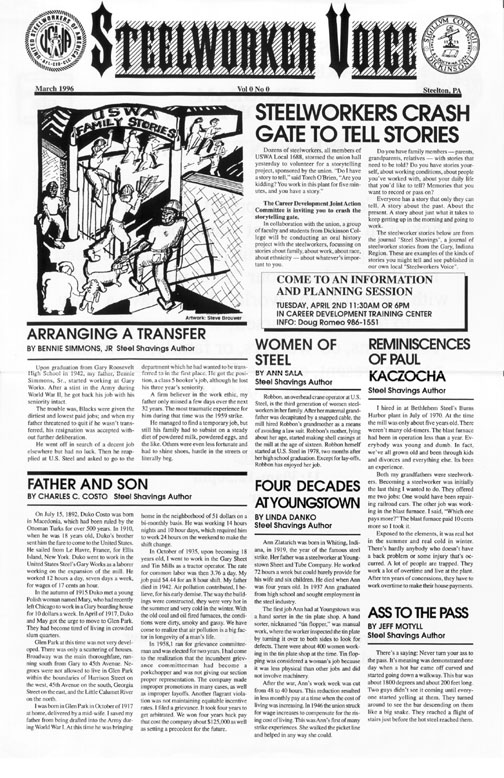
We arrived in Steelton at 5:30am to join Doug Romeo, Greg Bowers, Jamie, Yasmine, Murph and Becci in distributing copies of the “Steelworker Voice” to employees driving through the mill gates. Our goals was to attract both the men and women of Pennsylvania Steel Technologies to “storytelling sessions” about their lives as steelworkers. How did they come to work at PST? What are their specific jobs? How do they feel about their work environment? About management? About the union? In order to obtain the best turnout, we had to reach the steelworkers as they changed shifts. (Mosaic student interns: Becci Menghini, Erica Monheit, Christine Murphy, and Samantha Eburne)
Local Voices
- “In the mill sometimes this side would be burning up and the backside would be freezing. So you’d turn around and it would be just the opposite. Then you’s get wet and then you’re cold all the time…You always had a cold.” Mike Stubljar, retired Steelworker
- “Most days you spend time in the crane in the rail mill, that’s just the nature of the work. So there’s not a lot of social connecting, but of course in the crane you work by yourself. You’re kind of isolated, you just go in and do your job and get out.” Jim Roberts, Steelworker
- J: …At times, when I had my breaks, I would go out and just rest, get some air, cause, uh, when I operated, sometimes the temperature in that place would get as high as 120 degrees. It would get so hot down there, that to prove it to myself, I took an egg, and laid it on the console, and it fried. So, this is one of the reasons operators were given a break every two hours. I used to lay out there and watch spiders build their webs. I’d spend one half hour just watching spiders build their webs.
D: Who do you blame for the loss of steel-making?
J: Management’s greed…but who is going to listen to me?
D: I am.
J: The only regret I have with the mill, lost business and all of that, the company tried to blame all of that on the men. I have seen out there hundreds and hundreds and thousands of rail that we men knew was defective, only to see the bosses say ok, approve it and ship it out…And, I saw the companies that bought that steel send it all back because it was defective. But the company didn’t care; but they blamed it all on us.
— retired Steelworker Interview by Dixie Palmer - K: The machinist is a guy who fabricates and repairs, analyzes, machine parts for machinery.
S: What are the dirty jobs?
K: Well you know like, you sweep…the mill is a dusty dirty place, it always was, so if you sweep the floors, you sweep now and you turn around and look around and there is dust again, you know…My motto has always been, I am down here to make money not friends. I mean you make friends over a period of time, but I always put the fact that I am here to feed my family first before anything else. So I want the best job I can get when I’m down here and for a long time we had a hard time getting those. I am in a position now where I’m at one of the better jobs.
–Steelworker interview by Samantha Eburne
Return to Steel Mill page